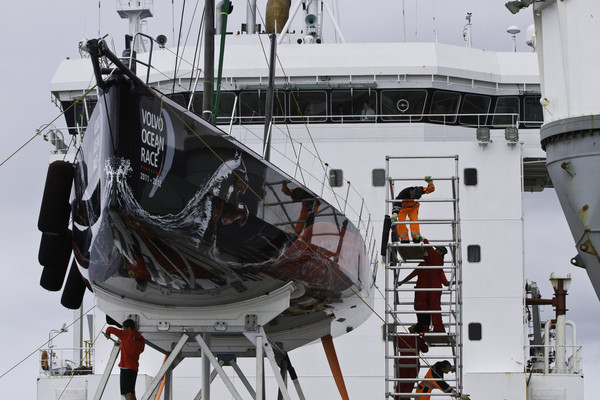Leg 1 may have finished, but the race to stay in the race continues and could see some major upsets
The opening phase of the 2011/12 Volvo Ocean Race is turning into one of the most curious editions of this famous race. While three boats may have finished in the conventional manner by crossing the finish line under their own steam, the other three have/will arrived in Cape Town by ship. Indeed, a total of four ships have been involved in getting the fleet to the end of the first leg. Two more will be required to execute the next two legs which could prove to be the most stressful ever for teams and organisers alike where shipping schedules will play a key part in the next two months.
The threat of piracy in the Indian Ocean means that the fleet will be shipped part of the way to the end of Leg 2 in Abu Dhabi. Leg 3 from Abu Dhabi to Sanya, China will also involve shipping the fleet part of the way as they come back out through the Indian Ocean. Clearly the logistics of craning a fleet of 70ft race boats on and off a ship while keeping to a schedule is challenging. But one of the issues that is making life more stressful for the event is the short stopovers that are now putting huge pressure on some of the players. In particular, Puma who are currently loaded on board the 350ft Team Bremen which is steaming its way from Tristan da Cuhna to Cape Town.
Puma expect to arrive in Cape Town later this week leaving precious little time to step the new mast and bed it in before the start of the in port race on Saturday and the start to Leg 2 on Sunday. Any delay in unloading Mar Mostro from the ship and/or stepping the mast could seriously threaten the team’s participation in the in port race and the start of leg 2. Cape Town is well known for its strong winds which have in the past delayed the launching of boats and stepping of masts.
For a team that had to retire from leg 1 and has no points on the board, missing any points from now on could be catastrophic of Kenny Read and his team. Little surprise he looks so anxious in the video posting of Mar Mostro being lifted onto the ship. Any further damage or even just a change in the weather, runs the risk of forcing them out of the race entirely.
“We had a fantastic first 24 hours steaming toward the leg 2 start,” said Read from on board the ship. “Problem is we will most likely see a strong southeasterly as we approach Cape Town, and that could not only slow down the ship but make unloading pretty tough.
Even for those that are already in town, time is tight.
“The stopovers in this race are so tight that if you have a significant problem then it is very easy to miss the re-start. As it happens Cape Town is one of the longer stopovers but it’s already feeling quite tight,” said Abu Dhabi’s skipper Ian Walker.
“The boat hasn’t got much work to do on it as we didn’t sail that far, but the critical issue for us is how quickly we can get the new rig and rigging back in the boat. Having decided to fit discontinuous rigging [in place of the continuous system that was initially fitted] we modified the spreader ends to take the new rigging. We not only have to cure the rigging on site, but we have to make sure everything is to the right length as well as going through the normal issues of going sailing and setting the rig up.
“Fortunately we have already used this mast on the delivery from Portugal to the start so we have bedded in all the fittings and know that the halyard locks work etc. But even so, we still only have four days available to get the boat ready for the in port racing.”
Even those who finished the leg on time are feeling the pressure and mindful of how easy it would be to drop the ball.
“If there’s one thing you can’t get around in this race it is generating time,” said Camper’s skipper Chris Nicholson. “All the programmes in this race are about getting over and around problems. Compared to previous events, re-fits will be compromised. It’s the same for everybody but what I don’t want to see is teams drawing in enormous shore teams to turn around the boats.”
So as the clock counts down towards this weekend’s racing and the start of Leg 2, there’re will be plenty of tension in and around the docks in Cape Town.
Yet assuming that the all the teams make it to the start, there will still be pressure on the organisers. While the first of two safe havens hasn’t been declared it is understood that teams are looking at anything between 10-18 days for the first part of the passage. Assuming that the loading/unloading and re-start process will take say two days and then adding on the shipping time plus another day to race the final stretch to the finish in Abu Dhabi, it is difficult to see how the fleet will arrive on Jan 1 as previously expected. The restart for the leg is on Jan 14 with an in port race the day before.
Once again it looks likely that the next stopover will be another race against time and the next leg absolutely crucial for teams to complete.




